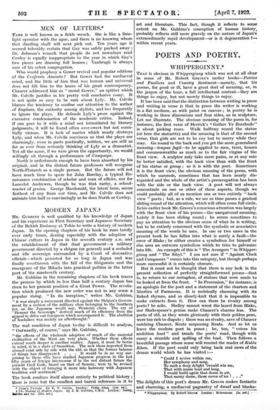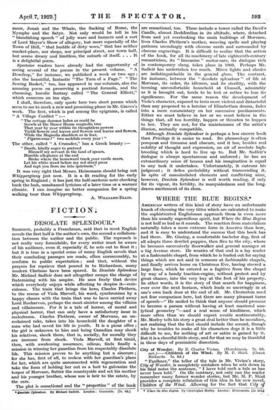POETS AND POETRY.
WHIPPERGINNY.*
THAT is obvious in Whipperginny which was not at all clear in some of Mr. Robert Graves's earlier books—Fairies
and Fusiliers and Country Sentiment—namely, that his poems, for good or ill, have a great deal of meaning, or, in the jargon of the hour, a full intellectual content—they are things to enjoy, but not merely things to enjoy.
It has been said that the distinction between writing in prose and writing in verse is that in prose the writer is working in a flat medium, as with paint on canvas ; in poetry he is working in three dimensions and four sides, as in sculpture.
Let me illustrate. The obvious meaning of the poem in, for instance, the first verse of Herrick's "Gather Ye Rosebuds" is about picking roses. Walk halfway round the statue (or here the statuette) and the meaning is that of the second verse, that girls are not to be coy but to marry while they may. Go round to the back and you get the more generalized meaning—tempus fugit—to be applied to men, trees, houses and commonwealths as much as to the fair virgins of the
front view. A sculptor mdy take more pains, or at any rate
be better satisfied, with the back view than with the front of his statue or group ; so it is with the poet. Sometimes it is the front view, the obvious meaning of the poem, with which he succeeds, sometimes that has been nearly dis- regarded and the whole of the artist's preoccupation has been with the side or the back view. A poet will not always concentrate on one or other of these aspects, though we could probably all of us mention one or two entirely "back view " poets ; but, as a rule, we see as time passes a gradual sliding round of the attention, which will often come full circle. In his earlier book Mr. Graves's conscious attention was largely with the front view of his poems—the unequivocal meaning.
Lately it has been sliding round ; he seems sometimes to pay no attention to the obvious sense of what he is writing, but to be entirely concerned with the symbolic or associative meaning of the words he uses. In one or two cases in the
present book he has fallen into what is surely a fault—the error of Blake ; he either creates a symbolism for hiraself or else uses an outworn symbolism which he tries to galvanize into life. An example of this is" The Avengers ". in Whipper- ginny and "The Sibyl." I am not sure if "Against Clock and Compasses" comes into this category, but though perhaps more successful it is certainly obscure.
But it must not be thought that there is any lack in the present collection of perfectly straightforward poems—that is, to return to our metaphor, of statues that were made to
be looked at from the front. "In Procession," for instance, is an apologia for the poet and a statement of the charters and liberties of Parnassus. It is metrically charming with its linked rhymes, and so closely-knit that it is impossible to make extracts from it. How can there be rivalry among
poets? he asks. Shelley cannot wrest the laurel from Blake, nor Shakespeare's genius make Chaucer's charms less. The poets of old, as they wrote gloriously with their golden pens, were too rich to dispute ; there was no rivalry, save of Chaucer outdoing Chaucer, Keats surpassing Keats. And so let us leave the modem poet in peace ; he, too, " voices his ambition loud" and treads the poets' road, though with many a stumble and spilling of the load. Then follows a beautiful passage whose sense will remind the reader of-Kubla Khan. If the poet could only bring back real news of the dream world which he has visited :— "Could I revive within me, Her symphony and song, To such a deep delight 'twould win me, That with music loud and long, I would build again that dome in air,
That sunny dome, those caves of ice ! . . ."
The delights of this poet's dream Mr. Graves makes fantastic and charming, a mediaeval pageantry of dwarf and blacks- • Whippergiesay. By Robert-Graves: London: Heinemann. lbs. -
moor, Jonah and the Whale, the Sacking of Rome, the Nymphs and the Satyr. Not only would he tell in his "blandishing speech" of jolly wars and harmers and a sort of Lord Mayor's Show of allegory, but more especially of the Town of Hell, "that huddle of dirty woes," that has neither market-place, nor shops, nor principal street, nor town hall, but seems dreary and limitless, the suburb of itself. . . . It is a delightful poem.
Spectator readers have already had the opportunity of seeing several of the poems in the present volume. "A Dewdrop," for instance, we published a week or two ago ; also the beautiful, fantastic "The Turn of a Page." "The Sewing Basket," too, has appeared in our columns, also the amusing poem on preserving a poetical formula, and the charming, bucolic fantasy called "The General Elliott," which concerns an inn sign.
I shall, therefore, only quote here two short poems which seem to me to Mark a neiv and Promising phase in Mr. Graves's work. The first, which is put among the epigrams, is called "A Village Conflict" :---
" The cottage damson laden as could be
' Scowls at the Manor House magnolia tree That year by year within its thoughtless powers Yields flowers and leaves and flowers and leaves and flowers, While the Magnolia shudders as in fear,
Pigurez-vous ' two sackfuls every year ! "
The other, called "A Crusader," has a Greek beauty :— " Death, kindly eager to pretend Himself my servant in the land of spears, Humble allegiance at the end . Broke where the homeward track,your castle nears, Let his white steed before my red steed press And rapt you from me into quietness."
It was very right that Messrs. Heinemann should bring out Whipperginny just now. It is a fit reading for the early spring in England ; it has just the half-sardonic note checking
back the lush, unashamed lyricism of a later time or a warmer climate. I can imagine no better companion for a spring
walking tour than Whipperginny.
A. WIT TJAMR■ELUS.











































 Previous page
Previous page